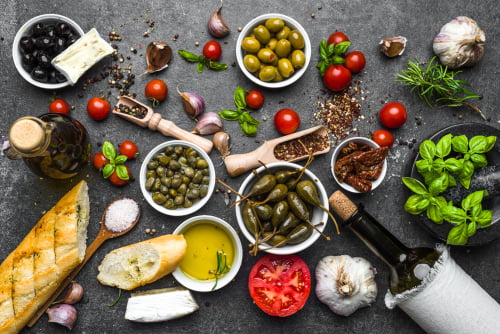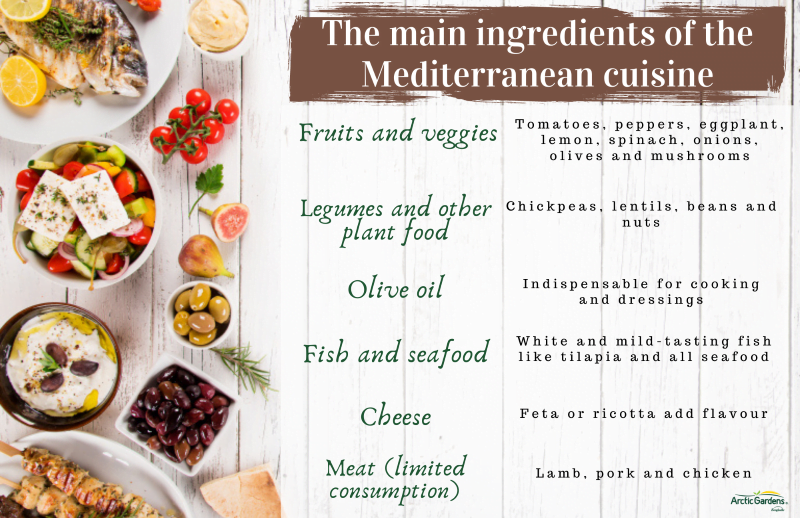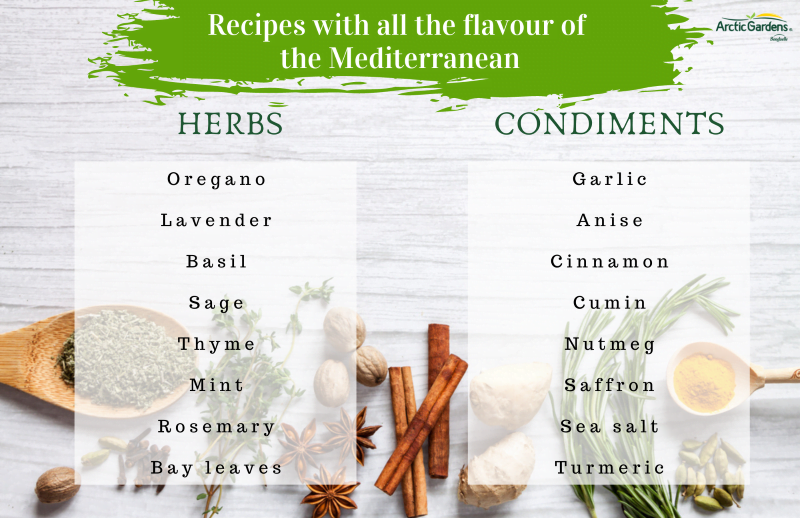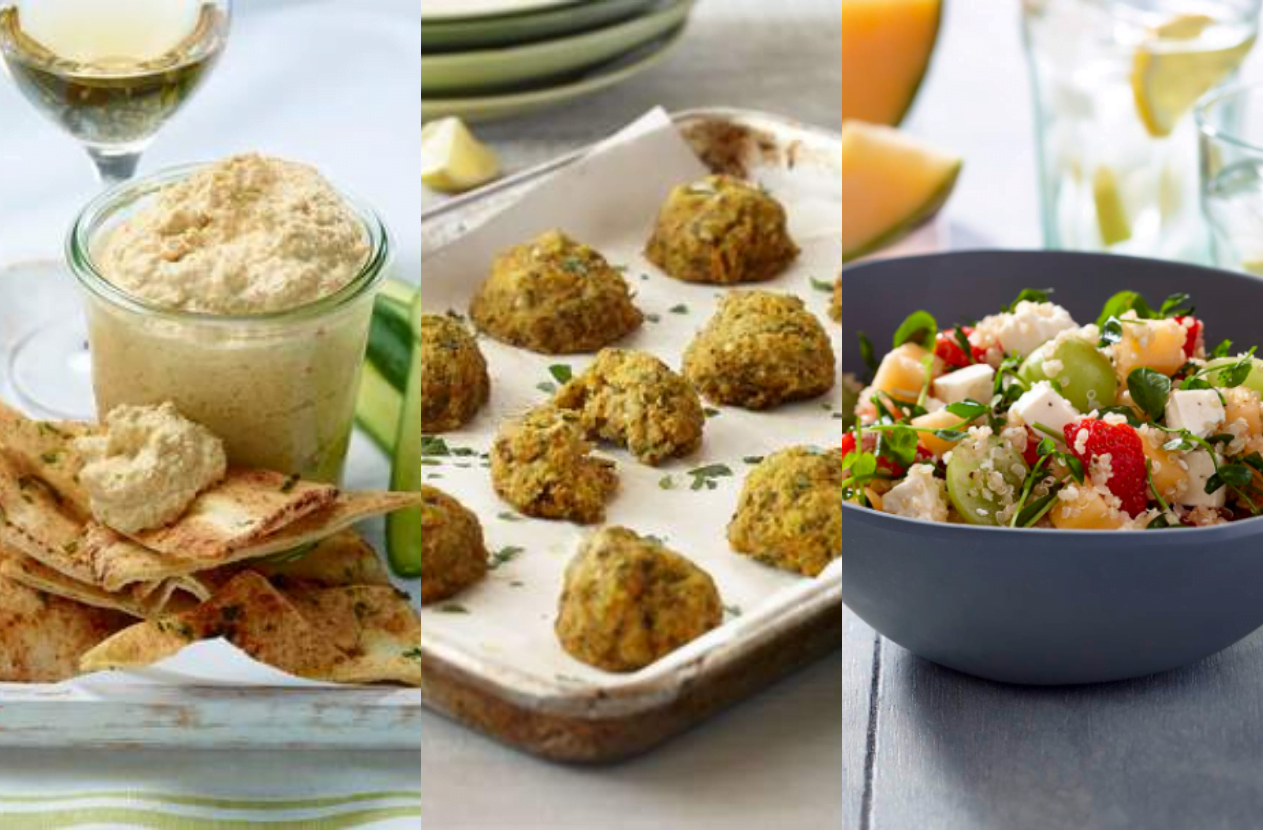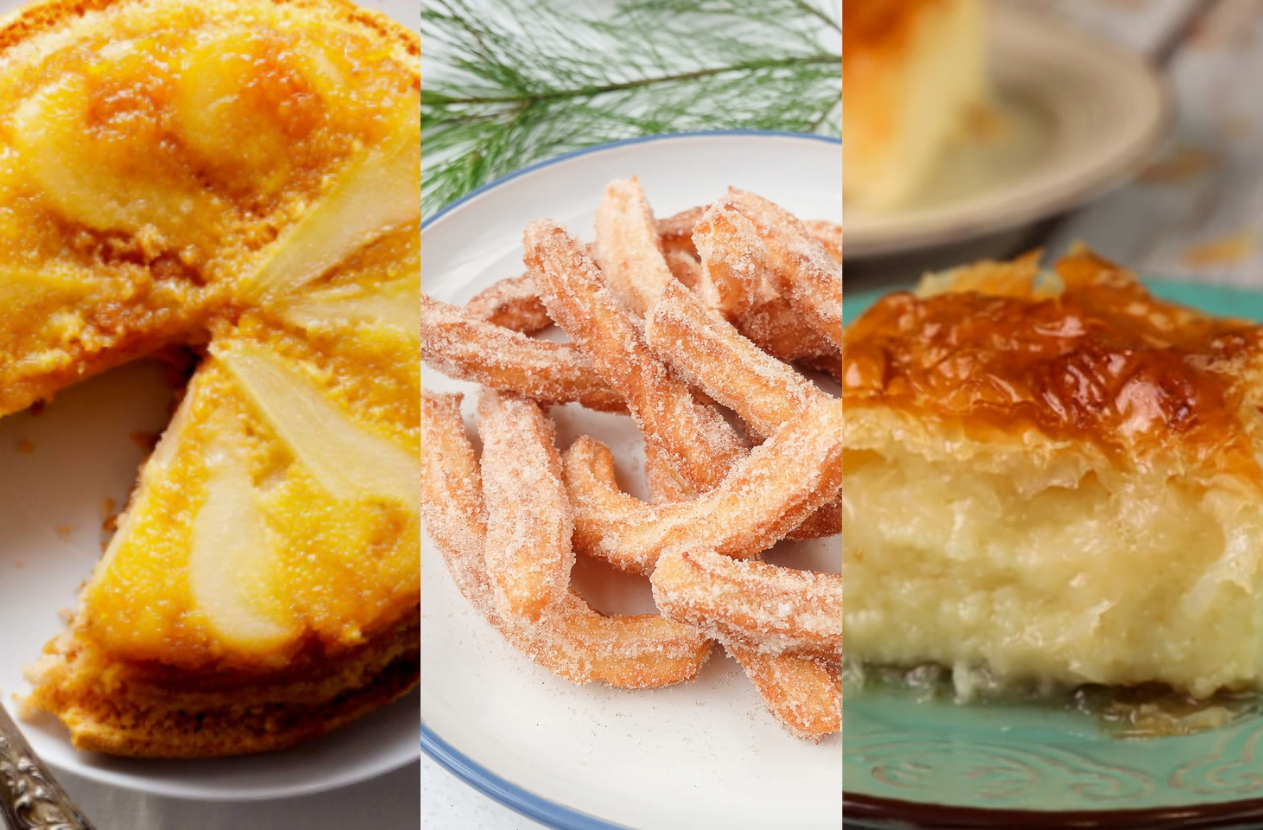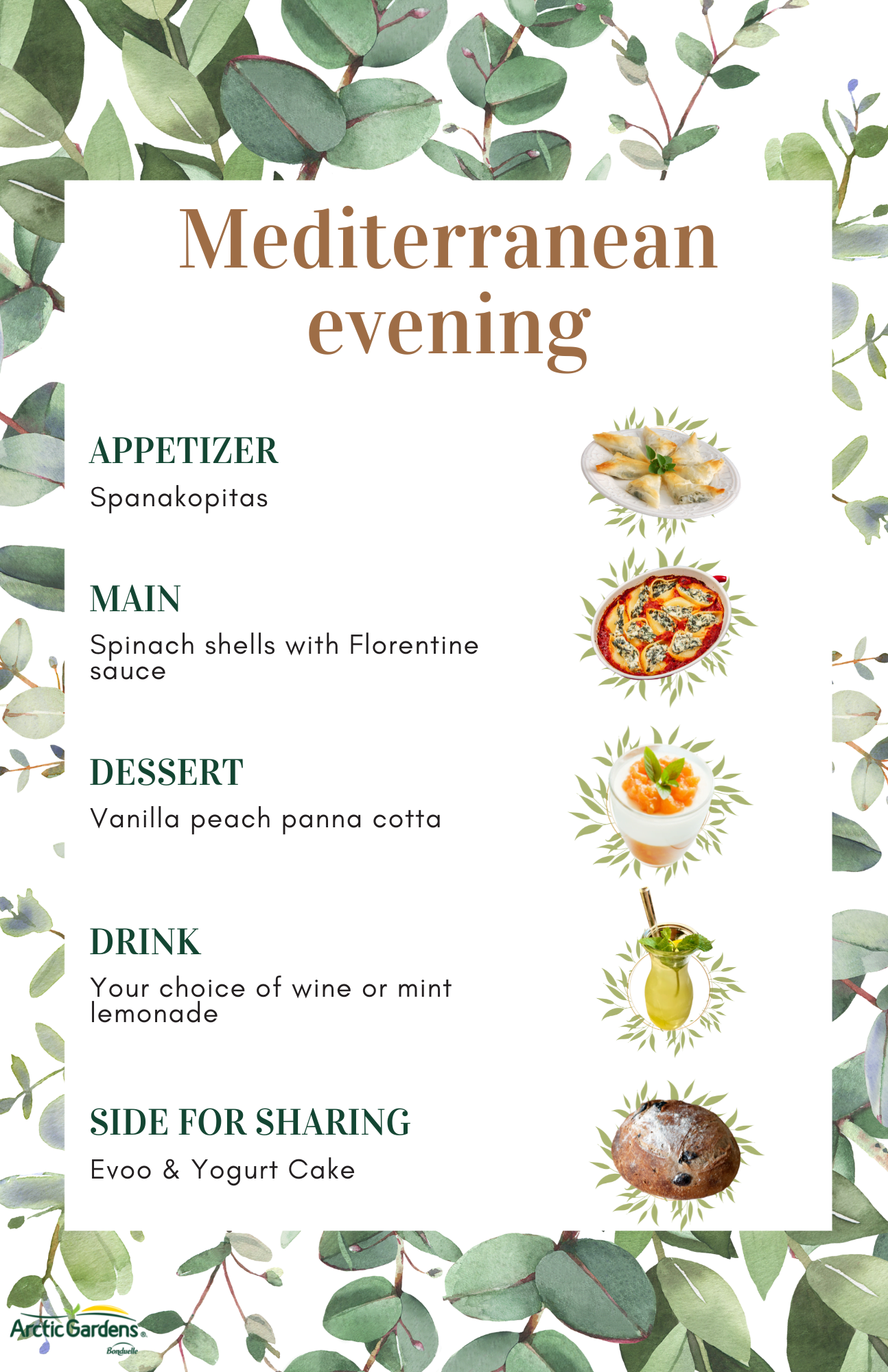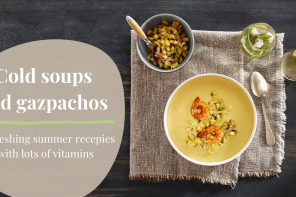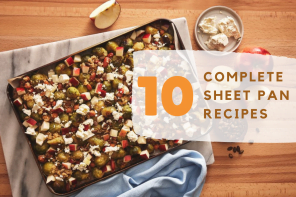Everything on Mediterranean cuisine
Flavour, colour and freshness are what make Mediterranean cuisine a ray of sunshine at your table. It’s one of the most varied cuisines in terms of flavour taste because of its herbs and spices. And the freshness is enhanced by the combo of legumes and grains.
We’d love for you to discover this generous and delicious cuisine so you can include it in your diet. That’s why we’re sharing the health benefits, essential ingredients and, of course, some recipes to help you enjoy a Mediterranean evening!
What is Mediterranean cuisine?
Mediterranean cuisine is defined by the food and preparation methods used by the inhabitants in the Mediterranean region. That is to say, the food of the people living along the Mediterranean Sea, from Spain to Morocco through Italy, Greece, Tunisia and other countries.
The popularity of this type of cooking grew with food writer Elizabeth David’s book in 1950.
The focus is on fresh products, pronounced flavours and simple preparation. Essentially, Mediterranean cuisine is made up of plant food and minimally processed staples where herbs and spices are essential ingredients.
Usually, there’s lots of fruit, veggies, legumes, grains, olive oil and aromatic herbs. Consuming dairy, eggs and wine in moderation, as well as fish and only a little meat.
Main characteristics
- Food most often consumed is plant-based.
- Meat products are also consumed in moderation.
- Not only is the variety of products is very important, but consuming local products to maximize flavour.
- Ideally, the products being harvested are consumed.
- There are limited sweet products.
- Olive oil is a common ingredient.
- Herbs and spices, onions and garlic are used instead of salt.
For your health
The truth is that adopting this type of eating will not only add a touch of freshness, colour and variety to your daily eating but also a few health benefits. Here are a few of the main ones.
Healthy fats for your body
Several studies have proven that this type of diet can reduce the risk of heart disease.
That’s because of healthy fats like monosaturated fats. They have positive effects on cholesterol and are found in olive oil, nuts and avocado.
In Mediterranean cuisine, you’ll also find a healthy amount of omega-3. This type of healthy fat promotes lower triglycerides which help control blood pressure.
It’s found mainly in fish like salmon, chia seeds, canola oil, and soy and soy by-products like tofu and soy milk.
Healthy digestive system
By eating a significant amount of fruits, veggies, and grains in a Mediterranean diet, you’ll get soluble and insoluble fibre (check out our guide on fibre, by the way) in food like chickpeas and lentils spinach, strawberries, tomatoes, etc.
Regularly eating fibre will help digestion by balancing your intestinal flora and making you feel fuller longer and limiting the absorption of grains, bad cholesterol, and carbohydrates.
Great source of antioxidants
Again, eating fruits and veggies as part of a Mediterranean diet is an important source of antioxidants for your body.
Foods like oranges, red fruit, red wine, flax and sunflower seeds, as well as legumes like chickpeas and lentils are part of this cuisine and will be antioxidant allies.
Some of the most important benefits of an antioxidant-rich diet from Mediterranean cuisine come from strengthening the immune system and reducing the signs of aging.
Protecting against type 2 diabetes
Studies have shown that low carbohydrate consumption in this diet can reduce the risk of developing type 2 diabetes by 30%.
Most of the food in this diet has a low to moderate glucose index, meaning fruits, veggies, fish and nuts.
These foods keep your blood sugar levels stable and limit episodes of hyperglycemia, which reduces the risk of diabetes.
A healthy brain
Studies have also shown that people who eat a Mediterranean diet have a 33% lower risk of developing Alzheimer’s disease because of the nutrients and vitamins.
As well, this cuisine lowers the risk of developing neurodegenerative disease.
Remember
Before changing your diet, you should consult with your doctor to get personalized advice based on your health condition
Mediterranean cuisine – step by step
Now that you know the benefits Mediterranean cuisine has to offer, we’ll show you the main ingredients and give some tips for preparing delish recipes.
Main ingredients
Herbs and seasonings
Herbs and seasonings are essential in Mediterranean cuisine because they bring out the food’s taste. Here are the most used.
Preparation tips and tricks
Seasoning
Don’t be afraid to be generous with herbs and spices to season your Mediterranean recipes.
In Mediterranean cuisine, some herb pairings are thyme, cilantro and basil that enhance the flavour of chicken, while dill balances the flavour of fish.
Here’s our guide to pairing spices and herbs so you can give your recipes an unforgettable taste!
Here’s a tip
You can also grow your own aromatic herbs. Your dishes won’t just taste great, but there’ll be a touch of freshness typical of Mediterranean cooking. We’ll share our guide on how to grow your own herbs.
And finally, season veggies by tossing them in olive oil and your choice of herbs and seasoning before cooking. That’ll accentuate the flavour.
When it comes to cooking…
If it’s summer, the barbecue is your best friend. It’s the latest in Mediterranean cooking because barbecuing elevates flavours even more. Make sure the grill is well-oiled and at the right temperature.
Tip
Double the tinfoil when you’re cooking veggies. This little trick keeps the juices in for firm, juicy veggies. (Discover other tricks to preparing veggies on the BBQ.)
Lemon juice is essential for Mediterranean marinades because they tenderize fish and meat. And plain yogurt is perfect for making soups and it’s healthy!
You should also know that some recipes may take longer to prepare than others. Therefore, if your recipe includes root vegetables, keep in mind that you need to cook them longer at lower temperatures. The reverse is true for eggplant and mushrooms that contain a lot of water and cook quickly.
Finally, in a true Mediterranean dish where pasta is included, the pasta must be cooked al dente, meaning tender, but still firm. For more freshness, you can make your own pasta, here’s how.
When it’s time to serve
Traditions in Mediterranean countries mean that food is synonymous with sharing and hospitality (with a glass of good wine).
For this reason, if you want to organize a Mediterranean evening with family or friends, in addition to the mains, don’t forget to put out some fresh bread and a small dish of olive oil and spices as a dip.
For more dipping options, you can make the well-known tzatziki, which contains yogurt, cucumber and dill.
Finally, serve the salad in a large bowl so that each guest can take a portion. Drizzle the salad with olive oil and add some feta.
Tip
If you want to make your plates look pretty, garnish them with grilled cherry tomatoes and olives.
Recipe ideas
At Arctic Gardens, we love to inspire you, so here’s our selection of Mediterranean recipes and a menu we’ve prepared to make your Mediterranean evening memorable!
Appetizers
Strawberry, melon and feta quinoa salad
Mains
Mediterranean Pie with Peppers
Mediterranean Pasta Salad with Spiced Chickpeas
Desserts
Mediterranean evening menu
Discover the recipes:
Main: Spinach shells with Florentine sauce
Dessert: Vanilla peach panna cotta
Drink: Your choice of wine or mint lemonade
Side for sharing: Evoo & Yogurt Cake
Mediterranean cuisine is without a doubt synonymous with food diversity. The preference for plant-based products and the limited consumption of meat make it a cuisine full of freshness and, above all, very healthy.
We hope this guide will serve as inspiration for your next Mediterranean recipe creation. Tell us in the comments about other Mediterranean recipes you’d like to make.


